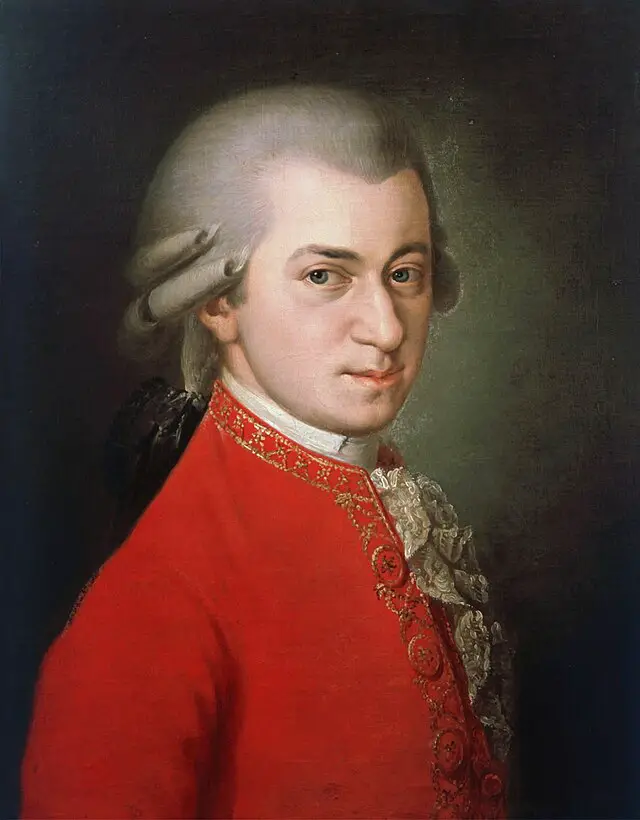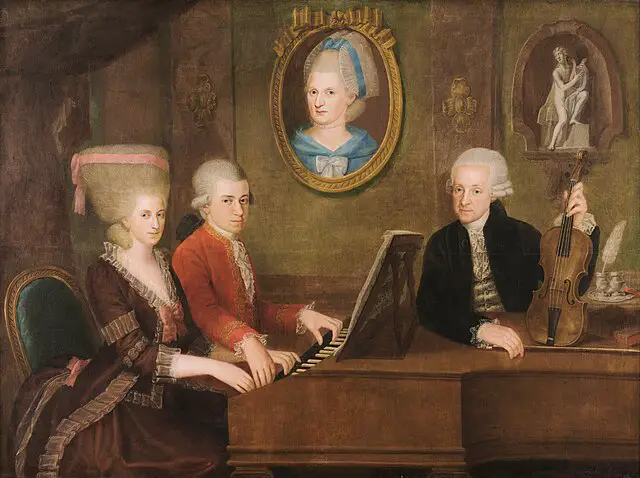Imagine Your Toddler Writing Symphonies. No, Seriously.
It sounds fake, right? Like some exaggerated tale your great-uncle tells at dinner after a couple glasses of wine. But here’s the thing: Wolfgang Amadeus Mozart wasn’t just good for his age. He was composing music that still gets performed today, before he had even lost all his baby teeth.
By age five, he had written his first compositions. Not “Twinkle Twinkle” knockoffs. Legit music. He was playing the harpsichord like it was an extension of his fingers, and within a few years, he was performing across Europe, dazzling royalty who probably didn’t know what to do with this powdered-wig-wearing mini-genius.
The OG Boy Band Tour: Europe, 1760s Edition
Mozart’s father, Leopold, was kind of the original “momager” before Kris Jenner made it a thing. A musician himself, Leopold recognized early that little Wolfgang wasn’t just special, he was next level. So, he packed up the family and hit the road.
We’re talking grueling tours in horse-drawn carriages, endless hours of travel, and cold, candlelit rooms where 6-year-old Wolfgang would blow everyone’s minds with improvised sonatas and effortless mastery of multiple instruments. Imagine the stamina it takes to tour in modern times. Now subtract Wi-Fi, modern medicine, and heating.
And yet, the kid thrived.

How Does That Even Happen? Was He Born With Sheet Music in His Crib?
Okay, here’s where things get interesting. Yes, Mozart was a prodigy. His brain was a perfect storm of talent, training, and obsession.
Scientists today still marvel at his memory and auditory processing. He could hear a piece once and write it down note-for-note. That’s not just skill. That’s bordering on supernatural. But he also practiced a lot. His dad wasn’t exactly chill about it. Think of a Tiger Dad with a violin.
But Mozart wasn’t some robotic overachiever. His letters reveal a cheeky, sometimes downright goofy personality. He was known for his love of wordplay, his crude jokes (look up “Leck mich im Arsch,” no really), and his deep emotional sensitivity. He was weird in a genius way.
From Child Star to Fully Grown Icon (With Bills to Pay)
As Mozart aged, things got… complicated. Stardom doesn’t always translate into stability. He butted heads with employers who didn’t get his vibe. He craved independence in a time when composers were expected to play the obedient court servant.
So he struck out on his own. Freelanced. Took commissions. Wrote operas like The Marriage of Figaro and Don Giovanni, which weren’t just musically brilliant, but bold social commentary. He basically roasted the aristocracy with a harpsichord.
And yet, he struggled financially. He lived large when he had money and borrowed when he didn’t. He was bad with cash, generous to a fault, and plagued by bad timing. His final years were a blur of creativity, debt, illness, and mystery.
A Legacy That Echoes Through Time
Though Mozart died young, his legacy has only grown with each passing year. His works continue to be performed in concert halls, opera houses, and homes around the world, drawing audiences of all ages. His ability to blend classical forms with emotional depth and innovative structures set him apart from his contemporaries. Today, his influence can be seen not only in classical music but also in film scores, modern compositions, and even pop culture.
Mozart’s music is timeless, his symphonies still stir the soul, his operas continue to dazzle with their dramatic flair, and his chamber music remains a benchmark for composers to this day. His ability to express both the grandiosity of the human experience and the smallest, most intimate emotions through music has ensured that his works remain as relevant now as they were over 200 years ago.
Yes, He Died Young. But He Didn’t Die Forgotten.
Mozart died at 35. That part stings. No dramatic finale, no riches or grand tomb. He was buried in a common grave.
But his music? That didn’t go anywhere.
Today, Mozart is everywhere: concert halls, movie soundtracks, cartoons, ringtones. He’s the gold standard. And knowing he accomplished all of it before most of us figure out how taxes work? That’s both humbling and mind-blowing.
So What Do We Do With That?
We remember that genius comes in many forms. That brilliance doesn’t always fit into neat boxes. And that even the most gifted among us can be messy, funny, broke, misunderstood, and still unforgettable.
Mozart wasn’t just a prodigy. He was a human lightning strike.
Sources:
1. Solomon, Maynard. Mozart: A Life. HarperCollins
2. Zaslaw, Neal. Mozart’s Symphonies: Context, Performance Practice, Reception. Oxford University Press
3. The Mozart Project. https://www.mozartproject.org/
4. Letters of Mozart. Translated by Emily Anderson.

